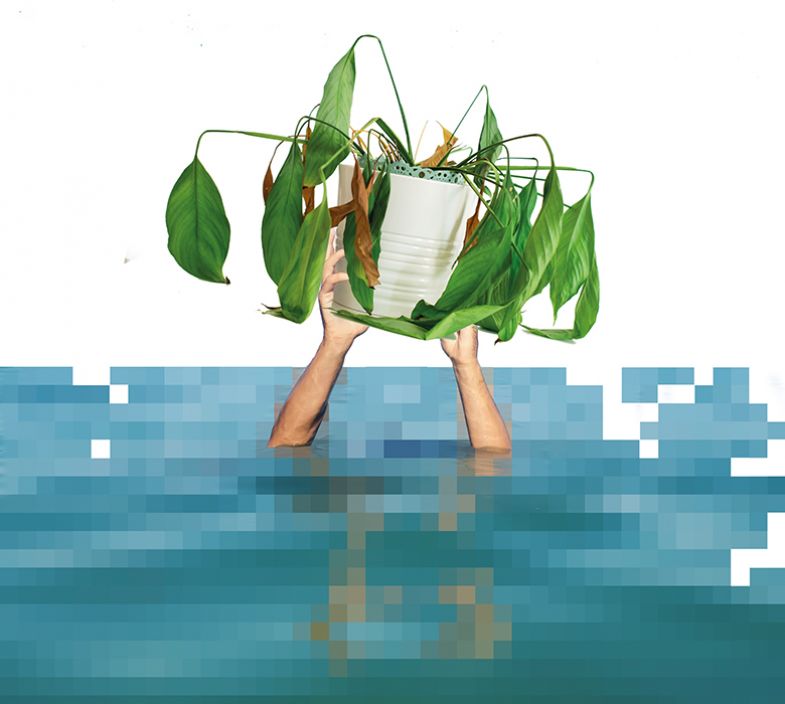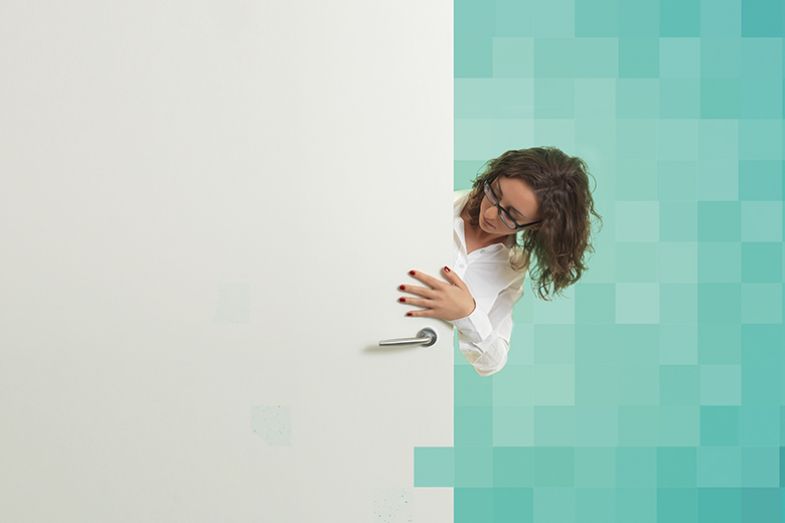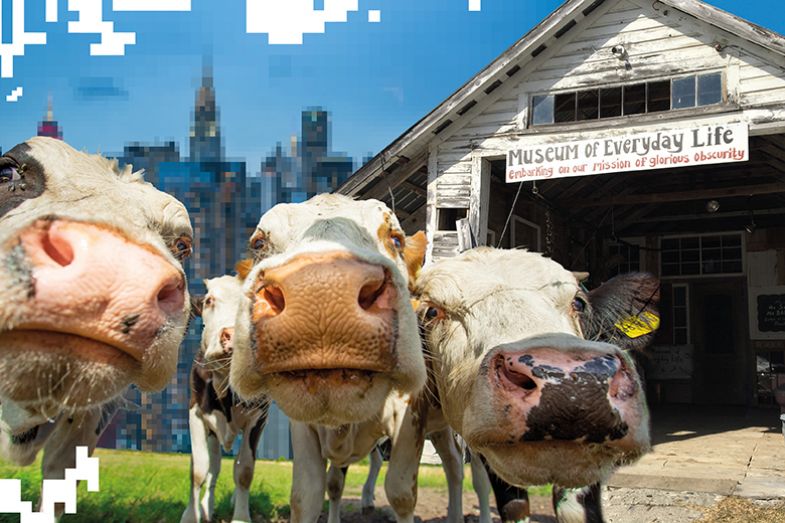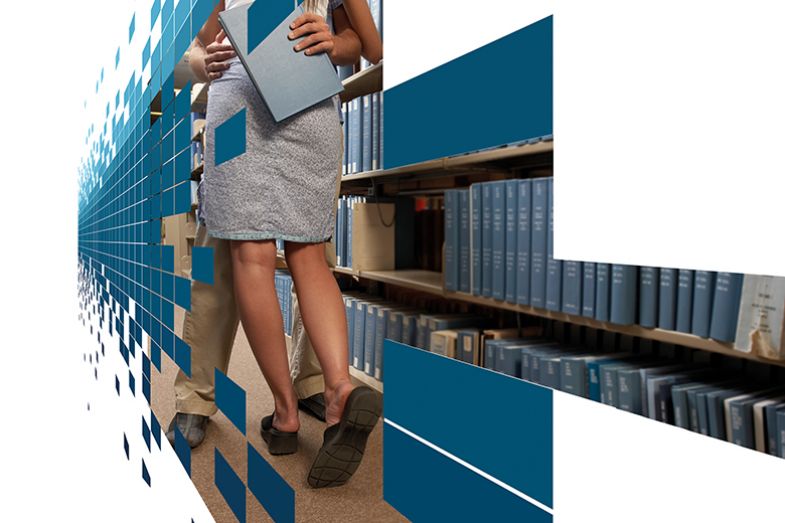‘After this is all over, I’m bringing my kids to work at every possible opportunity’
Ask an academic what they miss and don’t miss about working on campus and you might be surprised by the answer. And I mean the real answer, not the PR-approved stock answer. Of course academics terribly miss all their wonderful fee-paying students, their colleagues, their students, the excellent buildings and facilities, and, of course, their students. Thank you, Simon from the press office.
But the reality that academics won’t publicise? Students, sure. The likeable ones, anyway. Colleagues? This is complicated. A few of them, certainly: at least those we choose to work with. But most departments are like families only in the sense that they’re a random group of often quite unusual people thrown together by fate and forced to coexist. And that always goes so well.
What does an academic really miss about campus life? Try the mountain of random papers and unopened mail on their desk since 2008; there’s nothing like a monolith of historical cellulose to create a sense of order in an academic’s universe – and to offer a convenient hiding place. Or their favourite pot plant, which has proven so resilient to lack of attention that it really deserves to be listed among the junior academic staff. Or perhaps their hidden liquor cabinet, kept well away from the prying eyes of human resources.
What don’t we miss? Personally, I’m someone who has always worked at home as much as possible, so there are elements of this brave new world that I find quite appealing. It’s more efficient and far more compatible with the demands of parenting. It avoids the need to run for trains that turn out to have been delayed or to wrestle with the communal printer, the communal coffee machine, the communal anything (have you smelled your department’s communal fridge lately?). And it means not having to put up with an office that vibrates like a cheap motel bed from those adjacent building works that began during the Triassic period.
As an added bonus, there are no more tedious committee meetings where you have to pretend to be paying attention. Now you can just turn off your video and mic, make a cup of tea and hope nobody asks you a question. That said, when meetings do take place under lockdown, they tend to be brief, efficient and full of humour. Good luck to Professor Rambling if he wants to take his chances with the four- and five-year-old children sitting either side of me like a couple of miniature hostage takers – ticking timebombs of impatience – by waffling on about something off-topic. After this is all over, I’m bringing my kids to work at every possible opportunity.
All flippancy aside, it pays to remember – as someone on Twitter pointed out the other day – that despite how it may feel, we are not “working from home”: we are “at home during a crisis, trying to work”, doing the best we can but, most importantly, trying to save lives. Most of the things that used to matter don’t right now.
So, to my fellow academics: stay safe, stay inside, deploy your children as weapons if you have them, and enjoy plenty of gin and boxsets if you don’t. And when we do all get back to the office, perhaps we can trim some of the fat off our professional lives so that next time some enterprising pangolins try to solve climate change, the list of “things I don’t miss” is a lot shorter.
Chris Chambers is a professor and head of brain stimulation in the School of Psychology at Cardiff University.

‘Professors can be replaced, but a good secretary is the brain of a department’
When I walk into our department every morning, after I have caught my breath from climbing stairs up two storeys of our old building, my first stop is in the main office. I check my mailbox, sort out the junk into recycling and chat with the secretaries.
German universities usually assign a part-time secretary to each professor, one of the perks of a heavily administrative position. My colleagues decided years ago to pool their secretarial staff, giving the department a centre and a heart in a system that tends to silo off faculty from one another. I used to think I went into the main office to pick up my mail, but I’ve realised that this daily ritual was actually a way of connecting to other people before heading to the loneliness of a blank page or the anonymous noise of my email inbox. That is why I miss it so much now that the department is shuttered and all my work interactions are scheduled, take place on a computer and are focused on getting tasks done.
It’s not just that I have a deep respect for secretaries, though I do. I used to work as one in my student days (with the slightly fancier title of “administrative assistant”), and quickly learned that I could judge a person’s character by how they treated someone in my position. A chair I worked under in my first faculty job made a point of leaving job candidates in the main office for half an hour during their campus visits; the staff’s reports on how scholars behaved when they did not think they were being interviewed were telling. Professors can be replaced, but a good secretary is the brain of a department, foreseeing potential problems and knowing just who in the larger institution will be able to help solve them.
But, as I said, that is not why I miss my daily conversations with our secretarial staff. The true reason is that in a system that is often callous towards individuals, they have been an unceasing source of kindness, warmth and sage advice.
These are women who have laughed with me over some of the ridiculous aspects of university life, and have sympathised as I fought to hold back tears after particularly frustrating encounters with university administration. They have seen me come in to work desperately sick and told me in no uncertain terms to go home and rest. And when a kindergarten strike or a school holiday forced me to bring my son to work, they have produced coloured pencils and marvellous stores of candy.
I miss seeing them because our conversations are filled with pragmatism and humanity. They remind me that an institution is more than its name and its pretensions: it is a web of connections between people, woven by small habits and everyday gestures of care.
Irina Dumitrescu is professor of English medieval studies at the University of Bonn.

‘The best thing about large teleconferences is that they are great opportunities to tidy up your office’
I am something of a veteran of self-isolation, having spent an increasing fraction of my time working from home over the past few years.
I work in the life science area, specifically on crop diseases, but the actual lab work is done by my students and postdocs. I can’t say I miss working at the bench, and I expect that my group would quickly rebel if I ever put on a lab coat and started irritating them with questions such as: “Where do we keep the pipettes these days?” But I do miss visits to the greenhouses and growth chambers, following and scoring symptom development. I also miss browsing print copies of journals in the tea room or the library. And having worked in Australia, it’s nice to be able to go somewhere cool; having worked in Denmark, it’s nice to be able to go somewhere warm.
A surprising amount of the formal group mentoring and even the social interaction can be replaced by online conversations, but there are limits. Home working can’t replace the Friday afternoon drinks to celebrate a PhD defence, a grant or a paper accepted. And while it’s easy to have the nice conversations online, when the PCRs are working and results are flowing, it is much harder to have the tough ones when experiments are failing for no apparent reason. I don’t see how you could start a new group member from the comfort of your home office either, and while productivity can be maintained if you stick to a calendar, I can see that it will be more difficult to cross-check odd or surprising results for as long as we are barred from campus.
Working from home can be very effective. Sole-occupancy lab offices have become increasingly rare during my career, but you can set up your sole-occupancy home office so that everything is exactly where you want it. I certainly do not miss the 50-metre treks to the printer only to find that I either haven’t pressed “print” or the paper has run out. Several years ago, spending one day a week at home for a few months allowed me to break the back of my first sole-authored book.
I am missing going to conferences though. My last one was in Rome, just as the first coronavirus deaths were being reported in Lombardy. Since then, all the events I was due to go to have been postponed or cancelled. The next securely scheduled event in my diary is in 2023.
This has prompted people to try various forms of mass online events, but I am struggling to work up much enthusiasm for them. The best thing about large teleconferences is that they are great opportunities to tidy up your office and computer desktop.
I think we have to admit what people might consider to be a dirty secret. We enjoy going to conferences not just for the new information or even the catching up with mates. Their chief lure is that they are where the drama – both intellectual and human – of your discipline unfolds. Everything else is watching from the sidelines.
Richard Oliver has recently retired as John Curtin distinguished professor of agriculture at Curtin University, Western Australia.

‘Working only an hour or two at a time makes productivity seem a laughable concept’
What I missed most initially about campus life was the security of routine. But, several weeks into working from home, there is more of a rhythm to our now enmeshed work and family lives, and the contrasts with our pre-pandemic lifestyle are clearer – in ways both expected and unexpected.
Despite the significant adjustment to caring for our two toddlers all the time (and supposedly also working), I don't miss the morning rush of getting everyone ready and the drama of daycare drop-off. Starting the day is a far more pleasant business – even if the struggle to get the children dressed remains approximately the same.
Granted, I do miss the peaceful sanctuary and very personal domain of my office, one of the privileges I coveted most about becoming a professor. But I am finding ways to achieve much-needed equilibrium without that.
And although working only an hour or two at a time makes productivity seem a laughable concept, I don't miss my slavish dedication to my desk and computer out of a compulsion to be productive. It’s clear that I wasn’t particularly productive anyway, when you consider the amount of time I was parked in my office chair. And I definitely don't miss everyone’s (myself included) being “too busy” to connect and talk science.
Surprising connections have arisen that I hope very much will outlast social distancing, like a weekly video journal club that has brought together principal investigators and trainees in my field from all over the nation and the world. The first meeting had 65 attendees and very lively discussion among people who would otherwise only interact, at best, at a conference once a year. Like a biologist studying the response of an organism to environmental stress, I will be curious to see whether these adaptations in teaching and science communication become permanent, positive innovations once the “experimental condition” is removed.
I thought I would miss student interactions in the classroom. Yes and no, because I have found that, for example, an online discussion forum that we substituted for lectures actually ended up yielding many more questions than my live lectures ever had. As much as I value the physical classroom, I have come to see for myself how online and asynchronous formats can support more types of learners (and personalities).
I find that what I miss most about physical human interaction is the little things. A particular example is the parade of people past my open office door: the purposeful stride of my postdoc, with her “kitchen sink” handbag on her forearm; the apologetic duck of my graduate student’s head as she comes to my door with a question; the cheerful bob of another student as she waves good morning.
“If only science could be done without people,” I used to joke – a wry comment on the time I spend managing the human natures in my research group. But now it is the very door that I sometimes yearned would close that I wonder when I will have the privilege to reopen.
Jessica Seeliger is associate professor in pharmacological sciences at Stony Brook University, New York.

‘Teaching from a garret in rural Vermont has left some students wondering why we’re bothering to continue’
I taught my last on-campus class on 10 March. To avoid using the New York City subway system, I cycled over 65 blocks to work that day. It seemed like a good idea, but I wasn’t the only New Yorker now commuting to work on a shared city bike. When I arrived, I couldn’t find a docking station anywhere near campus.
I did eventually dock my bike, but not before cycling to a different neighbourhood and running six blocks back to my classroom. In the end, I arrived for my final on-campus class 10 minutes late, out of breath and flustered. It was a total disaster. Fortunately, it was also poorly attended. Even before the university’s closure, our students were returning to homes around the world.
Since late March, I’ve been teaching in a sharply contrasting location: an old farmhouse in Northern Vermont. Leaving our small high-rise apartment in Manhattan was difficult. But with two professors teaching online and two teens studying online, temporarily moving to a larger home was a matter of necessity, not luxury, for my family. Reflecting on our final days in New York City, being here is also a relief.
Still, there is a lot to miss. New York City is expensive, dirty and loud, but it is always interesting. This is precisely what attracts students to my university. They arrive to start a band, get famous, network with people in the art world and secure internships at museums, publishing houses and media companies. I like to think that my classes matter, but the context is as important as the curriculum. For this reason, teaching online from a turn-of-the-century rural garret not far from the Canadian border hasn’t only upended my delivery model. It has left some of my students wondering why we’re bothering to continue at all.
I appreciate their perspective, but I also keep reminding them that culture isn’t limited to cities. As evidence, I’ve even started to share images of my new life in farm country. Last week, it was a photograph of an unattended museum of everyday life that I discovered in an old barn. The museum’s slogan – “embarking on our mission of glorious obscurity” – seemed uncannily timely. But that’s not the only reason I shared the image.
As a cultural studies scholar, theories of everyday life are part of my curriculum. Usually, it’s remarkably difficult to persuade students that everyday life might be interesting. At the moment, it isn’t a struggle at all. There is nothing like the shock of the unfamiliar to render everyday life visible and valuable. And this may be the one thing the current disruption has offered me and my students: an uninvited occasion to shift our attention from the spectacular to the everyday.
Kate Eichhorn is associate professor and director of culture and media studies at The New School in New York City.

‘I fear that my teaching has gone virtually meaningless’
I did my doctoral work in history at the “academical village” founded by Thomas Jefferson. One of the traditions of this village – better known as the University of Virginia – is for students to address faculty members as “Mr” or “Ms”; the title of “Dr” is reserved – as Jefferson wished – uniquely for medical doctors.
Never have I felt the justice of this tradition as sharply as I do now. The novel coronavirus has made for a novel condition, one that carves a sharp line between essential and non-essential professions. Not surprisingly, different countries have different criteria for these categories. In France, boulangeries have been designated, along with pharmacies, as businesses of the “première nécessité”. In the Lone Star Republic, better known as Texas, two businesses that have long depended on one another – gun stores and emergency rooms – have lines outside their doors.
As elsewhere, universities in Texas also remain open for business; as elsewhere – apart from the sublime exception of Jerry Falwell’s Liberty University – they have gone entirely virtual. But as I struggle with my online classes, I fear that my teaching has also gone virtually meaningless. While there are many things I miss about being on campus, what I miss most is the sense of meaningful – essential – activity. Take the teacher out of the physical classroom and you take away the reason for professional being.
No doubt this is partly my fault. My relationship to the computer is no better than that of the apes to the monolith in Stanley Kubrick’s 2001: A Space Odyssey. I grunt a bit and scratch my head a lot while trying to navigate the interactive platforms. When I succeed in connecting with my students, I nevertheless fail to connect with them in any deeper sense. Zoom is, I admit, a wonderful invention. But it also represents, I fear, a prevention to effective teaching.
Here is where I should quote Plato on the shift from the spoken to written word, or Marshall McLuhan on the medium being the message, but I’ll spare you. Here’s the odd thing: when I gaze at the stack of boxes on my screen that frame the faces of my students, I don’t have the impression that I am leading a seminar. Instead, I have the impression that I am being dealt Tarot cards. And they foretell a future in which I may never recover the sense of being professionally essential.
Robert Zaretsky is a professor in the Honors College, University of Houston.

‘I even miss the library’s gigglings, munchings and canoodlings’
Now that they are gone, the value to me of whole tranches of everyday work life have come into view. These include lunch with colleagues in the sunshine on my urban university’s one patch of grass; a commute perfectly calibrated to the length of a half-hour podcast; and that wonderful feeling of the “after work” moment, when I would close my computer and open the door to the possibilities of the evening.
But, most of all, I think I miss the library. I miss the smell of its books, stored for years and brought briefly into the light by my retrieval. I miss the sounds of its muffled diligence and, yes, I even miss its less muted gigglings, munchings and canoodlings.
The library stands as a kind of physical embodiment of the shared enterprise of the university community. It is a community constituted collectively, not only by the students from near and far, the academics trawling the stacks, the countless authors who wrote the books and the librarians who catalogued and digitised them, but also by the security guards at the door, the barista making the coffee, and the porters ferrying books in the stacks. How often, pre-Covid-19, did I think of it this way? And what does my newly acquired sepia filter mask?
Higher education systems in Australia and elsewhere have for some time now relied on rising student debt, precarious work and financial dependence on overseas students and market investments. This is not a system for which to be nostalgic and, when this pandemic is over, I’d love to be able to say goodbye to this system’s reliance on casual contracts and investments in fossil fuels.
Then again, higher education is by no means the only sector whose increasing reliance on such practices has been exposed by the plight of its disenfranchised workers during the pandemic. Indeed, the entire contract between society and the state – between the past, present and the future – will be reshaped by this crisis, and universities will be reshaped with it.
So, as I look back to the things I once took for granted, I am also looking forward and thinking hard about how, in the months and years to come, higher education institutions might also be part of building a more just and sustainable society.
Tamson Pietsch is an associate professor in the social and political sciences programme at the University of Technology Sydney.
POSTSCRIPT:
Print headline: Life in the Zoomiverse: what we miss about campus
Register to continue
Why register?
- Registration is free and only takes a moment
- Once registered, you can read 3 articles a month
- Sign up for our newsletter
Subscribe
Or subscribe for unlimited access to:
- Unlimited access to news, views, insights & reviews
- Digital editions
- Digital access to THE’s university and college rankings analysis
Already registered or a current subscriber? Login










